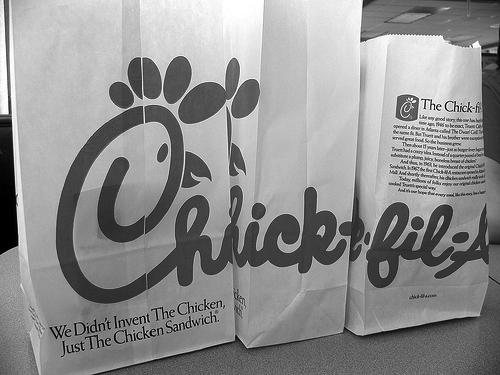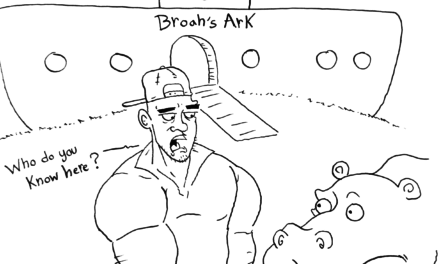I had hoped the Chick-fil-A controversy was done last week when I read that Chick-fil-A was changing course. The Atlanta-based chicken vendor apparently released an internal nondiscrimination statement and had further agreed to re-evaluate the groups to which its charity arm, the WinShape Foundation, gave funding.
My hope, however, was short-lived. Slate later reported that on the same day as the above announcements, WinShape co-sponsored a couples’ biker event with the Family Foundation, a group some have accused of being anti-gay. No doubt the controversy will continue as a result.
The sad part of all this is that this issue actually has little to do with Chick-fil-A. Chick-fil-A, due to the outspoken religious beliefs of Dan Cathy and the monetary donations it has made, is simply the symbolic whipping boy in a cultural battle built around two sides that see themselves in an intractable conflict.
In reality, it’s not intractable at all. Just polarized.
In reviewing the Wheel‘s coverage of the Chick-fil-A controversy on campus, a big pattern stuck out. It appeared in the editorial board’s own statement on the subject, which argued for replacing our Chick-fil-A with “another restaurant that doesn’t alienate segments of the student body.” Another appearance was in the eloquently-written letter of graduate student Karen McCarthy, who said that as a lesbian, she “cannot afford to take as anything other than a direct attack the actions of Cathy, Chick-fil-A and all of those” who support groups believed to be anti-gay.
In both those comments and in other comments I have seen from both Chick-fil-A supporters and opponents, there is little flexibility. Either you “hate” religious or conservative groups, or you “hate” LGBT people and alienate them on principle.
No debate, no consideration, no “inquiry-driven, ethically engaged, and diverse” conversation.
Unfortunately, flexibility is exactly what this discussion needs. Human sexuality is far more complex than we all care to think about. There is no “gay gene” that flips on or off like a light switch, just like there is usually no straight-up choice to “turn gay.” Homosexual attraction likely stems from a more complicated mix of biological, developmental, social and psychological factors.
As such, the issue for most people currently isn’t the attraction itself. The response to that attraction is the bigger issue.
Some religious and social groups, out of a moral belief that God’s ideal sexual life for men and women is found in traditional marriage, have created organizations that seek to promote and strengthen traditional marriage. Many people who feel same-sex attraction seek support from those groups.
Others chose to affirm and embrace same-sex attraction as a co-equal ideal. Many other LGBT individuals joined this push, either for the creation of civil unions or for more all-encompassing changes by legally reclassifying marriage.
The two sides are indeed very different. But somewhere along the line, in the milieu of identity politics, nuance was ejected from the conversation. Pro-traditional marriage was transformed into anti-gay, and political and ideological differences became “hate.”
But why? Amy Miller, Michigan Law alumna and assistant editor of The College Conservative (a commentary website where I also contribute), wrote in her piece titled “On Being Gay: Fighting the False ‘Hate’ Dichotomy” that “for most of our natural born lives, college and professional school-aged people have been trained to believe that our feelings and self-esteem are the most important things in the world … Therefore, when someone disagrees with our lifestyle – our gayness, or our partying habits, or our sex life – it’s not just disagreement, it’s a grudge against us as a person.”
This is the crux of the issue. Disagreeing on something is not automatically “hatred” of the other.
Just because someone’s personal or religious convictions preclude them from supporting gay marriage, or prompt them to fund pro-traditional marriage organizations (which, it is important to note, are very different from actual anti-gay organizations like the Westboro Baptist Church), does not automatically mean that they “hate the gays” and need to be cast out of the public square. Conversely, pro-gay marriage or pro-civil union advocates do not automatically “hate” religious or nonreligious folks who oppose their view.
Both sides are losing their ability to intellectualize and objectively debate the issues at hand. This is why Chick-fil-A is just a whipping boy: it’s a big, visible symbol of a conservative company.
By attacking or defending the company, both sides are merely engaging in a symbolic chicken-fight that only serves to deepen the divide.
Without the ability to set aside our sacred cows – or chickens, in this case – we will never be able to engage one another like rational human beings.
Because that’s what we all are. Human beings. And we should never forget that simple, unifying fact.
David Giffin is a second year Masters in Theological Studies student at Candler School of Theology from Charleston, Ill.
The Emory Wheel was founded in 1919 and is currently the only independent, student-run newspaper of Emory University. The Wheel publishes weekly on Wednesdays during the academic year, except during University holidays and scheduled publication intermissions.
The Wheel is financially and editorially independent from the University. All of its content is generated by the Wheel’s more than 100 student staff members and contributing writers, and its printing costs are covered by profits from self-generated advertising sales.






I “disagree” with your white skin.
Thanks for proving my point.
It’s not a question of sexuality or choice or genes etc.
It’s a question of the marginalization of a group of vulnerable people. To a group on the margins, a statement like Cathy’s “Guilty as charged” response is an attack.
Organizations that “support traditional marriage” further marginalize homosexuality (along with everything else that is not heterosex) by branding it a sin, an aberration, a sickness, a punishment, etc.
The most vulnerable should be treated with the most care. We should be breaking bread with them in their homes, commending them and listening to their stories.
1234,
I understand your argument, and I do agree to an extent. Bullying, active discrimination, etc. are entirely unjustifiable, and forcing groups onto the margins of society knowingly or unknowingly can be extremely harmful and problematic.
However, I stop disagreeing with you at the point where protection of the the margin disables us from having an honest conversation about human nature and action. It may need to be delicately handled, but without being able to genuinely discuss a phenomenon like sexuality we will never be able to fully understand it or reasonably act in response to it. That means that we have to be able to include even disparate voices in that conversation as coequal participants.
But when one group claims the status of the victim or the marginalized party, they make certain claims about their ethical status – and in this case, that makes certain other voices that might be more critical of them (for whatever reason) unacceptable. That’s where I draw the line.
We may disagree, but disagreement doesn’t automatically assume a malicious intent to harm. Unintentional? Maybe, and we can talk about that as a part of the conversation, but we have to be able to have that conversation first, and we can’t do that if one group is proclaimed as a default position to be hateful.
That’s what I was trying to get at, anyway. Hope that makes sense.
Did this guy seriously just juxtapose homosexuality with “partying habits?”